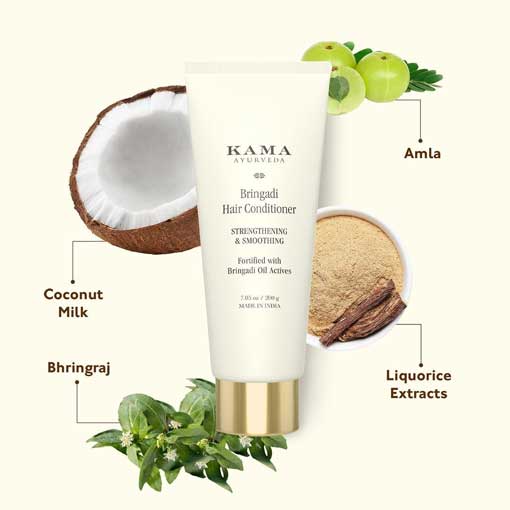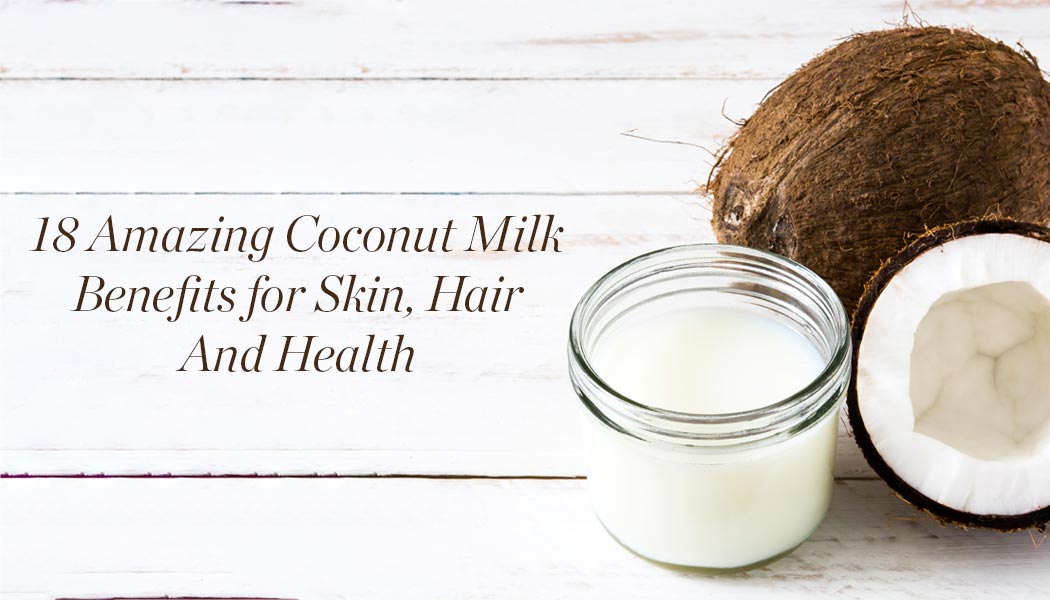Did you know that Coconut milk isn't just a culinary delight, but also a potent beauty and health booster? Packed with 21 essential minerals, 5 vital vitamins, and an array of benefits, this tropical gem has more to offer than meets the eye.
From radiant skin to strong hair and enhanced well-being, let's dive into the remarkable benefits of coconut milk and learn the best ways to incorporate it in our skin care, hair care and diet.
What Is Coconut Milk?
Coconut milk is that creamy, white liquid we often find elevating tropical dishes to new heights. Extracted from the flesh of mature coconuts, its distinct richness is a staple in many cuisines, particularly in Southeast Asian dishes.

How is Coconut Milk Made?
To make Coconut milk, one starts with the flesh of mature Coconuts. This is grated finely and mixed with warm water. A pressing process then ensues, extracting the creamy liquid. The initial press provides a dense, full-fat milk.
With more water and further pressing, you achieve a lighter consistency. This pressing method provides the milk with a vast majority of the coconut's benefits for skin, hair and health. Let’s now talk about some of these benefits in detail.
Benefits of Coconut Milk For Skin
Discover the wonders that nature's bounty, in the form of coconut milk, can bring to your skin. From soothing sunburns to nourishing dryness, Coconut milk's benefits are boundless. Let's dive into the remarkable ways Coconut milk can transform your skincare routine:
1. Sunburn Relief:
Applying Coconut milk to sunburned skin can hasten the healing process. The anti-inflammatory properties of Coconut milk provide a cooling effect, reducing pain, swelling, and redness.
2. Deep Moisturization:
Dry skin meets its match in Coconut milk. Gentle application of Coconut milk offers an impressive moisturizing effect for dry skin conditions like eczema, dermatitis, and psoriasis.
Its high-fat content ensures that when applied topically to dry skin, it acts as a sealant to retain moisture and hydrate. The fatty acids it contains act as natural moisturizers, replenishing the skin's hydration levels and lending it a soft, dewy glow.
You can use Coconut milk enriched Eladi Hydrating Ayurvedic Cream for intense moisturization and skin barrier protection.

What experts say -
"Coconut milk's unique blend of fatty acids and vitamins provides an exceptional solution for dry, sensitive skin. Its ability to deeply moisturize, coupled with anti-inflammatory properties, makes it a natural remedy for conditions like eczema and psoriasis." - Dr Aruna Purohit
3. Natural Cleansing:
For those with oily or acne-prone skin, Coconut milk serves as an effective cleanser, courtesy of its antibacterial properties. Importantly, the fats in Coconut milk do not clog pores, making it an effective makeup remover and ally against acne.
4. Restores Skin Health:
Historically, milk baths have been a popular skincare ritual. Coconut milk, with its superior properties, might just be the modern alternative. This tropical treasure c
5. Provides Necessary Nutrients:
The minerals in Coconut Milk play critical roles, from UV protection to collagen production. With an abundance of copper, which is vital for skin renewal and elastin development, coconut milk becomes a skincare staple.
Other minerals like iron, which stimulates cell turnover on the scalp and hair growth, magnesium (the 'miracle mineral' for skin), manganese, and selenium all collaborate to enhance skin health.
6. Prevents Premature Aging:
The amalgamation of vitamins and minerals in Coconut milk can deter wrinkle formation and promote youthful, radiant skin. Collagen, the primary protein in our skin, maintains its elasticity and vigor.
Vitamins like C, along with minerals like copper and manganese, bolster collagen production. Moreover, the fatty acids present further rejuvenate the skin.
7. Treats Skin Ailments:
The medium-chain triglycerides in Coconut milk, which include acids such as lauric acid, decanoic acid, caprylic acid, and caproic acid, are renowned for their antimicrobial, antifungal, and anti-inflammatory characteristics.
Due to these properties, Coconut milk is able to treat skin infections and kill acne causing bacteria.

Benefits of Coconut Milk For Hair
From revitalizing your scalp to enhancing hair growth, Coconut milk holds the key to healthy and vibrant hair. Let's delve into the transformative benefits it brings to your hair care routine:
8. Intensive Moisturization for Scalp:
One of the primary concerns many individuals face is a dry and itchy scalp. This dryness can result from various factors, from environmental conditions to hair products.
Coconut milk, with its high-fat content and moisturizing properties, can act as a savior for such issues. When applied directly to the scalp, it hydrates the skin, reduces itchiness, and combats irritation, giving a soothing sensation.
9. Conditioning the Hair:
Coconut milk isn't just beneficial for the scalp; it's a boon for the hair strands too. High in fatty acids, it penetrates deep into the hair shaft, nourishing and conditioning the hair from within. The result? Hair that feels soft, smooth, and naturally lustrous.
We recommend Kama Ayurveda’s Bringadi Hair Conditioner to get the best conditioning benefits of Coconut milk for hair.

10. Packed with Vitamin E:
Vitamin E is renowned for its antioxidant properties. When it comes to hair, it plays a pivotal role in repairing damaged hair follicles and promoting healthy hair growth. Coconut milk, being a natural source of Vitamin E, ensures that the hair remains robust, reducing breakage and split ends.
11. Tackling Hair Fall and Breakage:
The nourishing properties of coconut milk strengthen the hair roots, making them more resilient to breakage. Regular use can reduce hair fall, promoting thicker and more voluminous hair.
Benefits of Coconut Milk For Health
Laden with vitamins, minerals, and health benefits, Coconut milk is a humble ingredient that can be a vital ally in your journey towards overall well-being:
12. Nutrient-Packed Powerhouse:
Coconut milk isn't just a tasty addition to recipes; it's a nutritional powerhouse. Rich in essential nutrients like vitamins C, E, and B, as well as minerals such as copper, iron, and magnesium, it provides a boost to your overall health. These nutrients play vital roles in various bodily functions, from immune support to energy production.
13. Heart-Healthy Fats:
Contrary to common misconceptions, the fats in coconut milk are mostly medium-chain triglycerides (MCTs), which are heart-healthy fats. These fats are easily metabolized by the body for quick energy and have been linked to potential benefits for heart health. Incorporating coconut milk into your diet in moderation can contribute to a balanced fat intake.
14. Weight Management:
Coconut milk's MCTs don't just benefit the heart; they may also aid in weight management. MCTs have been suggested to increase feelings of fullness and boost metabolism, potentially supporting weight loss efforts when included as part of a balanced diet.
15. Bone Health:
The impressive mineral profile of coconut milk, including magnesium, phosphorus, and manganese, is crucial for maintaining strong bones and healthy joints. These minerals contribute to bone structure, density, and overall skeletal health.
16. Immune Support:
Vitamin C, present in coconut milk, is a well-known immune system booster. It helps in the production of white blood cells, which defend the body against infections. Including coconut milk in your diet can contribute to a stronger immune response.
17. Digestive Aid:
Coconut milk contains dietary fiber, which supports healthy digestion. Fiber aids in regular bowel movements, prevents constipation, and promotes a well-functioning digestive system.
What experts say -
“The diversity of vitamins in coconut milk makes it a standout for holistic health. Vitamin B5, for instance, is known to support adrenal function and hormone balance. Incorporating coconut milk into your diet could contribute to improved energy levels and overall well-being.” - Dr Kanchan Kachroo
Coconut Milk Nutrition Facts (per 100g):
- Calories: 552 kcals
- (The caloric content might vary based on the type of coconut milk and its fat content.)
- Total Fat: 57g
- Saturated Fat: 51g (Coconut milk's fat predominantly consists of saturated fats, which can have unique health implications due to their structure.)
- Monounsaturated Fat: 2.4g
- Polyunsaturated Fat: 0.6g
- Total Carbohydrates: 13g
- Dietary Fiber: 5.3g
- Sugars: 8g
- Protein: 5.5g
- Vitamin C: 7 mg (11% of the Daily Value)
- Folate (Vitamin B9): 38 mcg (10% of the Daily Value)
- Iron: 4 mg (22% of the Daily Value)
- Magnesium: 89 mg (22% of the Daily Value)
- Phosphorus: 240 mg (24% of the Daily Value)
- Potassium: 631 mg (18% of the Daily Value)
- Copper: 0.6 mg (32% of the Daily Value)
- Manganese: 2.2 mg (110% of the Daily Value)
- Selenium: 14.9 mcg (21% of the Daily Value)
(Note: The "%DV" signifies the percentage of the Daily Value of each nutrient in a standard serving size. This percentage can differ based on individual dietary needs and the reference dietary intake values used. The information provided is based on an assumed average daily intake of 2,000 calories.)
What experts say -
“Coconut milk's rich nutrient profile offers a range of health benefits. Beyond its well-known MCTs, it also contains trace minerals like selenium, which plays a crucial role in antioxidant defense, aiding your body's fight against oxidative stress.” - Dr Gopan G
How To Use Coconut Milk For Skin?
Here are a few ways to incorporate cCoconut milk in your skincare routine:
1. Direct Application:
Simply apply coconut milk onto your face using your fingers or a cotton ball. Leave it on for 20-30 minutes, then rinse with lukewarm water.
2. Coconut Milk Face Mask:
- Moisturizing Mask: Mix Coconut milk with Honey in equal proportions. Apply and leave on for 15-20 minutes.
- Brightening Mask: Combine Coconut milk with a pinch of Turmeric. This mixture can help in brightening the skin and reducing dark spots.
- Exfoliating Mask: Mix Coconut milk with Oatmeal to create a gentle scrub. This is great for removing dead skin cells and rejuvenating the skin.
3. Coconut Milk Bath:
Pour a cup or two of Coconut milk into a warm bath. Optionally, add a few drops of your favorite essential oils. Soak for about 20-30 minutes. This bath can leave your skin feeling soft and hydrated.
4. Coconut Milk as a Makeup Remover:
Saturate a cotton ball with Coconut milk and gently sweep across the face to remove makeup. It's especially effective for removing eye makeup.
5. Coconut Milk Cleanser:
Combine Coconut milk with a few drops of lemon juice. Apply this mixture to the face, massage gently, and then rinse. This helps cleanse and brighten the skin.
6. Soothing Sunburn Relief:
For sunburnt or irritated skin, apply Coconut milk directly to the affected area. Its anti-inflammatory properties can provide relief.
Kama Ayurveda’s Jwalini Retexturising Skin Treatment is a 100 percent natural after-sun remedy with pure Coconut Milk, that also provides relief from itching and irritation.
7. Coconut Milk Body Scrub:
Mix equal parts of Coconut milk and Sugar to form a paste. Use this as a body scrub during your shower routine. It can help exfoliate and hydrate the skin.
8. Coconut Milk Toner:
Mix Coconut milk with Rose Water in equal quantities. Use this as a toner after cleansing to refresh and hydrate the skin.
9. Night Cream Alternative:
If you have extremely dry skin, you can apply a thin layer of Coconut milk before bedtime and wash it off in the morning.
How To Use Coconut Milk For Hair?
Here are some simple yet effective ways to incorporate this beauty elixir into your hair care routine:
1. As a Hair Mask:
Mix Coconut milk with some honey and apply it as a hair mask. Let it sit for 20-30 minutes before rinsing it out. This mask can hydrate and rejuvenate the hair, making it silky and shiny.
We recommend Kama Ayurveda’s Post-Wash Hair Mask, a deep conditioning treatment with Coconut milk to repair broken bonds and protect hair.

2. Direct Scalp Application:
For those with an extremely dry scalp, direct application might work best. Massage the Coconut milk into the scalp and let it sit for a while before washing it off.
3. Incorporate in Shampoo:
Adding a little Coconut milk to your regular shampoo can enhance its moisturizing properties, giving you the benefits of coconut milk with every wash.
How To Add Coconut Milk To Your Diet?
Adding coconut milk to your diet is a delicious and nutritious choice. For practical and relevant ways to enjoy its benefits, consider the following options:
- Smoothies and Shakes: Blend coconut milk with fruits, veggies, and protein sources for a creamy and nutritious smoothie.
- Curries and Soups: Enhance the flavor and texture of Asian-inspired curries and soups by using coconut milk as a base.
- Coffee or Tea: Give your morning routine a tropical twist by adding coconut milk to your coffee or tea.
- Oatmeal or Cereal: Pour coconut milk over your oats or cereal to create a rich and satisfying breakfast.
- Desserts: Use coconut milk to make dairy-free treats like coconut rice pudding or chia pudding.
- Grains and Legumes: Cook grains like rice or quinoa in coconut milk for a delightful twist, or use it to flavor lentils and beans.
Additionally, consider incorporating coconut milk in your cooking for stir-fries, creating creamy salad dressings, using it in baking for unique flavors, enjoying it in smoothie bowls topped with fruits and nuts, and even exploring coconut milk-based cocktails for a tropical refreshment.
Remember to opt for unsweetened coconut milk for savory dishes and be mindful of portion sizes to savor the flavor and nutritional benefits.
What experts say -
“For individuals seeking to maintain a balanced diet while keeping an eye on calories, coconut milk offers a favorable option. Its creamy consistency can serve as a wholesome base for smoothies and sauces, enhancing flavor without compromising on nutrition.” - Dr. Vinny Narayanan.
